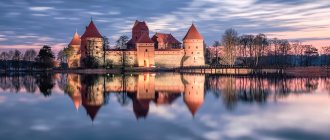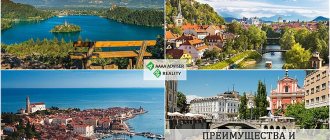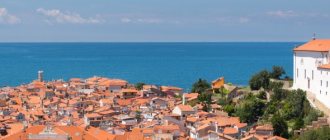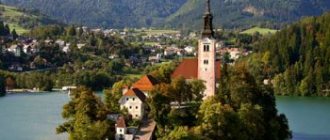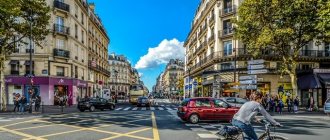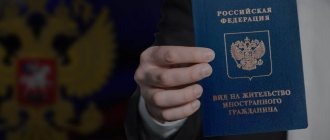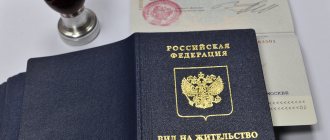BY REGISTRATION OF A COMPANY
Slovenia is one of the richest states of the former socialist camp, which has become a magnet for investors from all over the planet. Famous for its hot springs, Slovenia is located in the center of Europe. Mild climatic conditions, wild nature, mountain and coastal landscapes contribute to the fact that people from all over the world choose this country to live and work. The program for obtaining a residence permit in Slovenia is the most stable and clear opportunity to obtain a residence permit in Europe.
COST OF OBTAINING A RESIDENCE PERMIT IN SLOVENIA:
Cost – €10,000
This service includes:
- company registration*
- obtaining a residence permit for all family members**
*For Company Registration, it is necessary to deposit the authorized capital of at least €7.5 thousand. The authorized capital can be contributed in three ways:
- depositing funds into a bank account. The service of assistance in opening an account for depositing the Authorized Capital is included in the price;
- contribution of property acquired in Slovenia. The service includes an official valuation of the property contributed to the company.
- contribution of purchased government bonds of Slovenia. The service includes assistance in opening a special account with a broker to purchase these bonds.
**To apply for a residence permit, your company must fulfill one of the conditions:
- make an investment of at least €50 thousand in fixed assets
- show a turnover of €10 thousand within six months
MONTHLY COSTS OF RESIDENCE PERMIT IN SLOVENIA:
- €432 – salary tax and social contributions
- €120 – accountant
- €80 – legal address
- €1200 – registration if you don’t have your own
TIMELINES FOR OBTAINING A RESIDENCE PERMIT IN SLOVENIA:
- Company registration – 10 days
- Preparation of documents for residence permit - 60 days
- Obtaining a residence permit after submitting documents to the Consulate - 30 days
DOCUMENTS FOR OBTAINING A RESIDENCE PERMIT IN SLOVENIA:
- photocopy of international passport;
- certificate of no criminal record;
- color photo 3.5x4.5 cm.
PROS AND CONS OF OBTAINING A RESIDENCE PERMIT IN SLOVENIA:
A residence permit in Slovenia on the basis of employment in one’s own company has a number of disadvantages and, in turn, opens up new opportunities and prospects for the migrant.
Disadvantages of a residence permit in Slovenia
The disadvantages of a residence permit in Slovenia include the following facts:
- The initial residence permit is valid for one year. Then it is extended first for a similar period, and subsequently for 2 years.
- To obtain a residence permit, your company must continue to fulfill one of the conditions: have fixed assets worth at least 50 thousand euros or a turnover of at least 60 thousand euros over the last 6 months.
- Russians can only purchase real estate under a legal entity.
- There is no opportunity to work in government agencies.
- If the move is carried out on a business visa, then for the first 2 years you have the opportunity to work only at your own enterprise.
- It is extremely difficult to get a hired job without knowing the local language.
- In accordance with the new legislation, since 2015, foreigners who arrived on a work visa or business immigration can reunite with their family only after one year.
Advantages of a residence permit in Slovenia
A Slovenian residence permit expands the horizons of possibilities, which, of course, covers all the existing disadvantages. Having a residence permit in Slovenia provides a foreigner with:
- Opportunity to apply for permanent residence status and Slovenian citizenship
- The right to travel to Schengen countries without visas
- Opportunity to open an account in a reliable bank
- Opportunity to work in Europe;
- Opportunity to do business in a stable zone of the European Union
- Social protection in the form of social benefits, allowances and payments
- Access to quality medical services at the European level
- Possibility of free education for children
- Feeling safe thanks to low crime rates
- The opportunity to live in an impeccable ecological environment and enjoy the Alps, the Adriatic coast, lakes and rich fauna;
- Foreigners have the same rights as Slovenes, with the exception of the ability to vote.
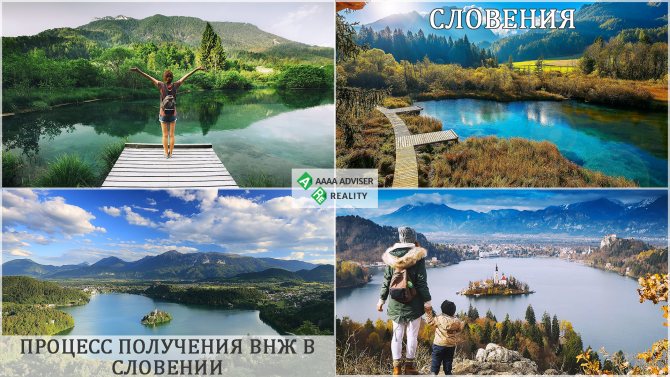
Residence permit in Slovenia when buying real estate 2021: a buyer's guide
How high are the fees of realtors and lawyers in Slovenia? What about other costs of purchasing real estate? Approximate calculations regarding the amount of additional fees and taxes when purchasing housing in Slovenia are presented in the table below.
| Expense item | Rate based on transaction price | Who pays? |
| Tax on transfer of ownership of real estate in Slovenia | 2 percent | buyer |
| Value added tax (VAT) | 20 per cent | buyer and seller |
| Registration fee | 0.01 percent - 0.50 percent | buyer and seller |
| Notary fee | 0.01 percent - 0.40 percent | buyer |
| Real estate agent services | 1 percent - 2 percent | buyer and seller |
| Costs to be paid by the buyer | 21.04 percent - 22.94 percent | |
| Expenses to be paid by the seller | 1.03 percent - 2.44 percent | |
| TOTAL COST OF TRANSACTIONS | 22.07 percent - 25.38 percent | |
How complicated is the process of buying real estate in Slovenia? After this jurisdiction joined the EU in 2004, EU citizens can freely buy property in Slovenia without restrictions. However, there are special procedures regarding the acquisition of agricultural land that apply to all foreign citizens.
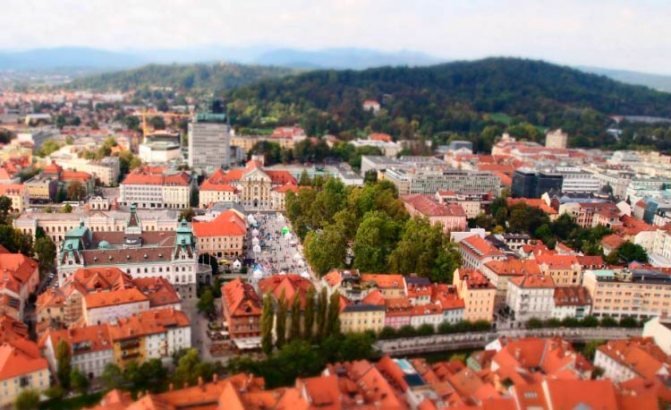
Foreigners have been able to buy real estate in Slovenia since February 2003 on a reciprocal basis. Reciprocity is a principle declared by the Slovenian Ministry of Justice on the basis of the “reciprocity law” (Official Gazette No. 9/99), according to which, any attempt by a non-EU citizen (i.e. third country citizen) to purchase real estate in Slovenia, requires Slovenians to have the right to buy real estate in the home country of such a third-country national.
Before purchasing real estate in Slovenia, the buyer must obtain a tax number and a social security number EMŠO (Enotne matične številke občana) from the local authority where the property is located. Their processing will take about three days.
Even if the buyer has decided on an investment property, experts recommend hiring a real estate agent. The status of real estate agents (nepremicnine) is regulated by law and obliges real estate agents to undergo licensing, registration and examination procedures. In theory, this ensures high quality of their work.
The buyer's agent contacts the seller and formally presents the buyer's offer. If this offer is accepted, the realtor will arrange for a preliminary contract to be drawn up, which will be translated into the buyer's language. When signing a preliminary contract, the buyer pays a deposit in the amount of 10 percent of the transaction price.
A search is then carried out for information about the asset in the Slovenian land registry. It uses a streamlined search engine to ensure that due diligence checks (including verification that the asset is not claimed by third parties and verification of tax payment) are quick and can be completed in as little as two business days! Make sure all documents are translated to avoid any errors.
If everything is in order, the buyer and seller sign the main purchase and sale agreement, and the buyer pays the remaining amount by settling with the seller. It takes from 35 to 64 days to complete the procedures necessary to re-register real estate in Slovenia.
The costs of purchasing and subsequently reselling real estate include attorney fees, notary fees, registration fees, taxes, agency fees, and so on. Registration fees include payments to the Land Registry and translation costs. These costs are minimal and should not exceed 0.50 percent of the property value. The registration fee for making an entry in the Land Registry is 0.5 percent of the value of the property, but not more than 80 euros.
Slovenian law requires the purchase agreement and other relevant documents to be translated (by a licensed translator) to ensure the buyer fully understands their contents.
In accordance with the law, re-registration of real estate must be certified by a notary. Each party pays for its own notary. The notary fee is calculated according to the following table (plus 20 percent VAT).
| Property price (€) | Fee amount (including 20 percent VAT) |
| Up to €4,590 | € 5 |
| € 4 590 — € 20 655 | € 14 |
| € 20 655 — € 68 850 | € 23 |
| € 68 850 — € 150 000 | € 46 |
| € 150 000– € 200 000 | € 56 |
| € 200 000 — € 250 000 | € 66 |
| € 250 000 — € 300 000 | € 76 |
| € 300 000 — € 350 000 | |
| € 350 000 — € 400 000 | € 96 |
| More than 400,000 euros | € 100 |
The calculation of the real estate agent's remuneration is controlled by law, and the maximum allowed is 4 percent (plus 20 percent VAT). Typically, the buyer and seller split the bill equally.
A tax on the transfer of ownership of a real estate property in the amount of 2 percent is charged for the purchase of property on the secondary market, otherwise (that is, when purchasing a new building) a value added tax (VAT) is charged.
PROCESS OF OBTAINING A RESIDENCE PERMIT IN SLOVENIA:
Despite the high standard of living, mild climate and other advantages of the country, Slovenia is currently little explored by our compatriots and therefore receives few residents of the post-Soviet space, however, the procedure for obtaining a Slovenian residence permit is relatively simple and transparent.
The first step is to register a company.
Any foreigner can register a company in Slovenia and work in it. The most optimal and economically safe option is considered to be a limited liability company (LLC), which in the local language has the abbreviation doo
The Slovenian market is relatively young, so many niches are not fully covered, which provides prospects for opening and developing your own company. Attractive segments include cargo transportation, rental of sports equipment, trade in electronic equipment, mobile phones and accessories.
- To register, the founders come to Slovenia. If one person arrives, then it is necessary to prepare a power of attorney from the remaining participants of the company. Each document must have a Slovenian court translation.
- Then a Slovenian Taxpayer Identification Number (TIN) is issued for each co-founder.
- Next comes the preparation and signing of primary documents on company registration with a Slovenian notary.
- Then an account is opened at the bank into which a minimum of seven and a half thousand euros is deposited. This amount will form the authorized capital, which can be spent exclusively on the needs of the company and the payment of wages.
- The enterprise is entered into the electronic register of economic entities in Slovenia. The registration procedure lasts from 5 to 15 days.
The second step is to obtain the right to obtain a Slovenian residence permit.
To obtain the right to obtain a residence permit during the business immigration process, after registering an enterprise, you must fulfill any of two conditions: purchase fixed assets (real and movable property, equipment, etc.) for the company in the monetary equivalent of at least 50 thousand euros, or have turnover of at least 60 thousand euros.
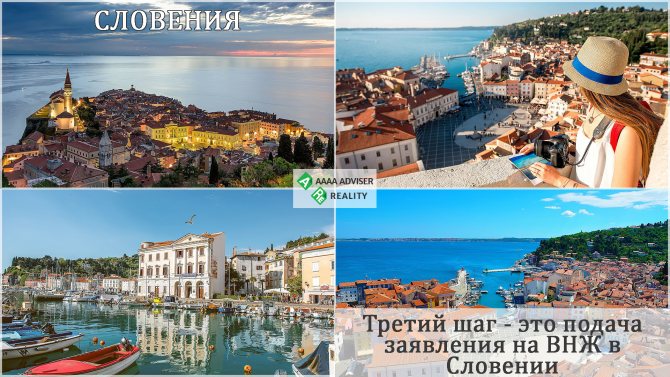
The third step is submitting an application for a residence permit.
After registering a company and fulfilling one of the conditions for actively conducting business, a package of documentation for a residence permit is submitted, which will require:
- address and name of the registered company in Slovenia;
- a certificate certified by a notary stating that there is no criminal record;
- Slovenian insurance; a copy of a valid passport;
- one photograph; the applicant's application form with his signature.
At this stage of business immigration, a package of documents is submitted to the Slovenian Consulate, and a fee is paid. The waiting period for a response on issuance is thirty days. Then, having received a plastic card, you need to register in two weeks, so it is advisable to register your residence address in Slovenia in advance, which can be obtained when renting housing under a contract or purchasing real estate.
Do not forget that after purchasing a residence permit, it must be renewed after a year. The renewal process is actually similar to the procedure for registering a residence permit: the same package of documents is provided as during the initial registration. If a citizen is on the territory of Slovenia, and the expiration date of the residence permit is approaching, then he should request an extension from the district administration at his place of residence.
Thus, after five years of residence on the basis of a residence permit, you can submit an application for permanent residence (permanent residence) in Slovenia and obtain an EU resident card. After which all doors will open to a foreigner.
Residence permit in Slovenia when purchasing real estate 2021: the situation in construction
Last year, Slovenia's construction sector expanded for the second year in a row. The Chamber of Commerce and Industry (Gospodarska zbornica Slovenije; GZS) expects growth to continue in 2019, although sector turnover will grow more slowly.
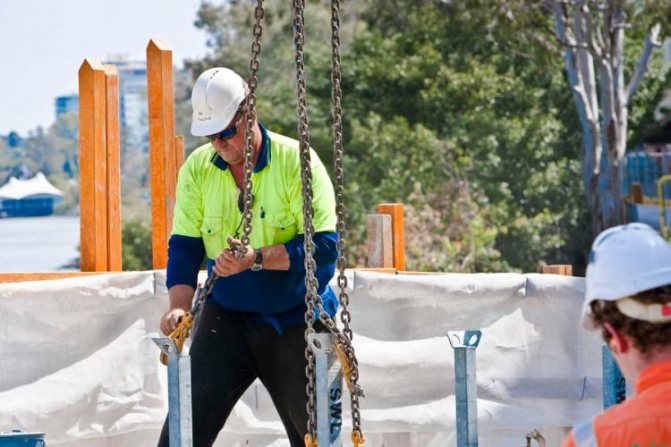
Data from the Statistics Office of the Republic of Slovenia shows that the cost of construction work in the country increased by 18 percent year-on-year in 2021, while in the first ten months of 2021 it grew by 21.5 percent year-on-year.
Housing construction costs in the third quarter of 2021 were 1.5 percent higher than the previous quarter. They were also 3.8 percent higher than the third quarter of 2021 and 8 percent higher than the 2015 average.
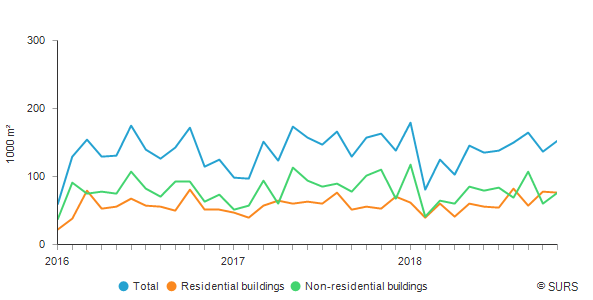
Area of buildings and structures whose construction was approved in Slovenia between January 2021 and November 2021
The cost of civil engineering work in the first ten months of 2021 increased by 21.7 percent compared to the same period last year. Experts explain such a significant increase in this indicator by the increasing shortage of labor resources and special equipment in connection with the construction of new and improvement of existing road and railway infrastructure.
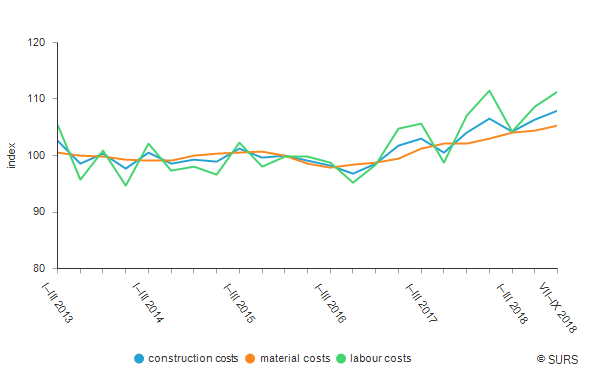
Construction cost indices for new residential buildings in Slovenia (2015 = 100)
GZS experts predict a single-digit growth rate for construction costs in 2021. They call staff shortages one of the sector's biggest problems. In particular, a key problem faced by almost all construction companies in Slovenia is the lack of engineering personnel. Another challenge is the unpredictability of projects and investments, which makes long-term planning in construction extremely difficult.
Most Frequently Asked Questions and Answers:
How long does it take to obtain permanent residence in Slovenia?
Having issued a residence permit in the specified country, after five years you can apply for permanent residence.
How long does it take to obtain Slovenian citizenship?
Slovenian citizenship can be obtained after ten years of residence.
Is it possible to gain access to local medicine based on this type of Slovenian residence permit?
Yes, a resident of the country has the opportunity to contact local medical institutions.
As a resident of Slovenia, is it possible to obtain a residence permit for the whole family?
Yes, the holder of a residence permit has the right to issue cards for his wife, children and parents if they are over 65 years old.
Will I and my children have the right to education in Slovenia after receiving a residence permit?
Yes, by obtaining a residence permit in Slovenia
You can study at local educational institutions.
How long does it take to issue a residence permit in Slovenia?
The document is issued for one year, then it is renewed every year, after 5 years you can obtain permanent residence.
Is it possible not to stay in Slovenia after receiving a residence permit?
The minimum period of residence, which is established by law, is at least 180 days a year. However, absence due to official necessity is an exception and allows, if necessary, not to reside in the country.
Is it possible to move freely around the European Union with a Slovenian residence permit?
Yes, all holders of a residence permit of a given state have this opportunity.
Can I purchase real estate in Slovenia for myself as a private person after receiving a residence permit?
Russian citizens can purchase real estate in Slovenia only through their own company. Citizens of the European Union, the USA and the UK can purchase real estate in the country as a private person.
What are the requirements for obtaining permanent residence in Slovenia in the future?
The main thing is, of course, not to violate the laws of Slovenia and pay taxes regularly. Also, to apply for permanent residence status, you must extend your residence permit status without interruption.
What rights does a Slovenian residence permit holder not have?
The holder of a residence permit in Slovenia does not have the right to vote, participate in elections or work in government agencies. Also, the holder of such a residence permit will not be able to purchase real estate as an individual.
Why can a residence permit in Slovenia be denied?
Due to the incompleteness of the documents provided, the presence of a criminal record and the lack of grounds for obtaining a residence permit.

